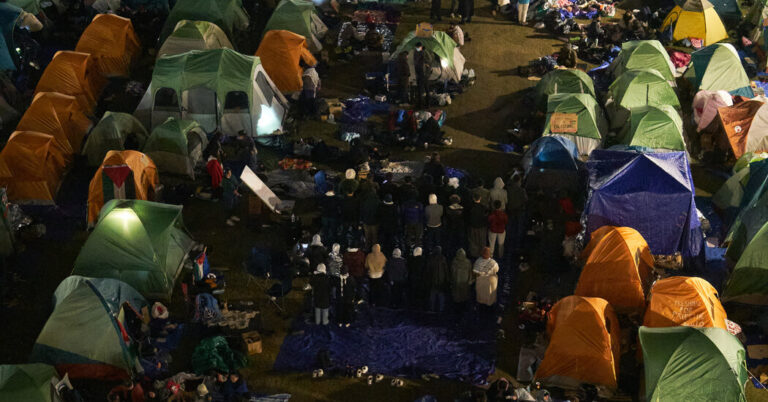Columbia University set a midnight deadline Tuesday night for disbanding an encampment of student protesters, after which New York City police could be sent in to clear the scene and make arrests.
In an email to the university two hours before midnight, Columbia President Nemat Shafik said university administrators were in talks with student organizers to try to reach an agreement before the deadline, after which the school would consider “alternative options” for clearing the lawn.
Almost a week ago, Dr. Shafik took an extraordinary step to enlist the municipal police in riot gear to arrest more than 100 activists who had refused to leave the tent city to protest the Israeli war in Gaza. This sparked criticism from all sides regarding his handling of campus protests. The camp reappeared larger than the initial camp after being emptied.
When Dr. Shafik’s letter arrived in inboxes Tuesday evening, protesters and others gathered outside the campus gates began reading it aloud. Chants arose around the midnight deadline.
On campus, student organizers told the group of demonstrators that they expected a police operation overnight and asked their comrades to wear a red headband if they wanted to be arrested and a yellow headband in the opposite case. Some students returned to their tents to collect their personal items in preparation for leaving.
After months of campus demonstrations protesting the war in Gaza, unrest came to a head during the final weeks of classes at some of the country’s most renowned academic institutions. On Monday, police were called to make arrests at Yale and New York University. Encampments also sprung up at Tufts, Emerson and the University of California, Berkeley.
Administrators struggled to balance students’ free speech rights with the need to protect Jewish students. Some protests have included hate speech, threats or support for Hamas, the Gaza-based armed group that carried out the attacks on Israel on October 7, sparking the war.
At Columbia, some faculty members circulated a draft resolution to censure the president because of what they called an “unprecedented attack on students’ rights.” At least one major Jewish donor cut supportsaying the university wasn’t doing enough to protect students.
Karla Marie Sanford reports contributed.


